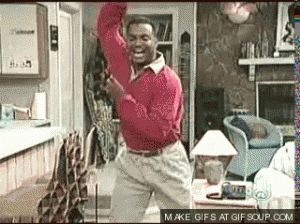In an ideal world, you would be in LOVE with your JOB, just like your romantic partner. You don’t want to just settle because he doesn’t snore, can cook and occasionally rubs your back – metaphorically speaking. So the interview is the perfect opportunity to assess whether there is chemistry or “a fit” in your 9 to 5 partnership. This “pas de deux” that can either be:
a) Kate Gosselin styles on Dancing with the Stars (awkward)
b) À la Jennifer Gray and Patrick Swayze (connected and appropriate)
c) Britney Spears Slave 4 You video (inappropriate)
Somewhere around B is what you should aim for and the guides below can help you assess the chemistry and provide some insight into routine moves based on my real life experience. Remember you are assessing them as much as they are assessing you.
1. SECRET: Being late isn’t necessarily a deal breaker. Don’t strive to be late but if it is inevitable, call to let them know and keep it reasonable within 5-10 minutes. Don’t dwell or worry about it – put your best foot forward. I ended up getting a job where I was minorly late for the first interview.
2. PREPARE: You’ll be asked for a copy of your resume when you don’t have it. At least that is what happened to me. Always bring your resume to the interview – they have printer malfunctions and run out of time too.
3. PREPARE: to remind the interviewer who you are. Literally. In one of my earlier interviewers, the VP did not have a hard copy of my resume and opened a soft copy of someone else’s resume (calendar error). He had no idea who I was and I was ill prepared to remind him in that scenario.
4. ANSWER: this is the most unique question I was asked: If you could bring 4 people alive or dead to dinner, who would they be and where would you take them? Just for fun, my dinner party consisted of: Bono, Tina Fey, Obama and Mark Zuckerberg.
5. ASK: how long the interview will be. If you go over, that is a good sign. Time is money and if a busy potential employer spends extra time with you, “he” is engaged and likes you. You also want a sense of how long you have so you can use your time wisely – get your key points across.
6. ASK: thoughtful questions, as they come during the meat of the interview. You can show how your mind works and make a strong impression through great questions. Leave the formal Q&A at the end of the interview for questions about the day to day, culture and so forth instead of trying to show off your research in an obvious, try hard, way.
7. ASK: about the hiring philosophy of the company to gage how conformist the culture is. A conformist culture likely exists where companies hire most employees right out of school and then promote exclusively from within. On the other hand, companies that frequently hire externally at all levels, tend to have more of a mixed, malleable culture, since fellow employees are a culmination of their past corporate cultures and work experiences. Asking to speak to someone at your level, employed by the company of interest, is your best bet to getting candid insight into culture (if you don’t know someone who already works there).
8. ASK: how success is defined/measured for your role (Team vs. Individual?) At my last company, each employee had fairly specific goals to meet, which created an individualistic culture where there were winners and losers. People at the same level were bell curved and rated in relation to one another. A company that has more team-based goals may provide a less directly competitively culture, with more collaboration. Neither culture is good nor bad it just depends on your preference.
9. GAGE: Are you interviewing for a role/team/initiative that is a key business priority? You will shine more without having to kill yourself trying, by getting onto a team/initiative that is a business priority (=visibility) in a large organization. You will benefit from general PR for those new initiatives, and they also don’t tend to have precedents for past performance (you create the benchmark). If you can specifically and concretely contribute to this larger priority, you will be golden.
10. ASSESS: Pay attention to the structure/tone of the interview = Company Culture. My last company had structured questions from HR that were geared towards the competencies that we got evaluated on at mid and year end and there was a predetermined rating scale for answers. While I can see how this makes sense, it showcases a rather by-the-book culture. I felt more comfortable during conversational interviews without a set question list.
11. ASSESS: Did the interviewer try to sell you on why the company/role is great? If yes, “he” wants you. You’d think you’re the one who needs to sell yourself, but I found in cases where I didn’t oversell myself, the interviewer tried to oversell me on why the opportunity was great. Like you, they can’t hide their enthusiasm when they think you are a great fit.
12. ASSESS: Did the potential employer reveal proprietary info to you? If yes, they want you. They wouldn’t risk giving you information that isn’t public, if they didn’t trust you and already envision you on their team.
13. ASSESS: Did the interviewer say “he” enjoyed himself? Did he initiate when you’d hear back? The way an interview ends can say a lot. If the interviewer is vague or unenthusiastic about next steps, then you may not have made it to the next round. However, don’t over analyze this since every person has a different communication style.
14. SECRET: “Thank you” follow -ups are unnecessary. I received two job offers when I didn’t send thank you notes to the decision makers. In other cases where I sent the “best” notes I could muster, I didn’t progress. Your performance in the interview matters more than what you say after.
15. SECRET: Even if you don’t get hired or you turn down an offer, try to keep the person in your network and send them a relevant article or tip or partnership opportunity when you can. This is a small world and sometimes the reason you met with an employer may lead to longer term benefit OR a different outcome than you realize.
There you have it, the above guides have revealed what you should be assessing in your partner’s dance moves, as well as what they may be assessing about yours, plus feedback on which moves are essential to keep your dance on track. The mirror ball trophy will be yours when the time is right.
Do you have any interview tips that help assess the sizzle or fizzle factor?



One that has always worked for me is: act nervous. And I don’t mean in the insane way. Just nervous. Like you’re very excited about this job so you’re a bit nervous about because this job interview is SO DAMN IMPORTANT to you!
If you’re secure enough of yourself, you should be able to pull it off. Prepare yourself, put on your act, you’ll leave ‘wanted’.
Hi Daan, thanks so much for that tip! I don’t tend to pretend ever (its hard enough being myself lol).
I knew one interviewer that always would ask how clean their car was. His intent was to gauge how organized you were in your personal life because that might reflect your organizational skills in your professional one. I’d say to just be prepared for anything to come your way and answer their questions confidently.
Hey Steve – interesting question about the car clean. An interviewer might be disappointed if they saw the inside of mine sometimes. Awesome advice!
I think just viewing the exchange as a conversation and the opportunity to size up the co/role as well, makes you better prepared to handle those curve balls.